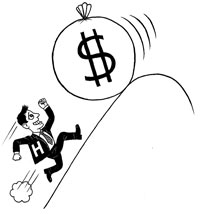Why Harvard Is Bad for Wall Street
Obscure Economic Indicators Part 6: Harvard Business School graduates on Wall Street.

The bright young things from Harvard Business School are making their way to Wall Street in droves. Some 26 percent of the HBS class of 2004 took stock-market related jobs, up from 23 percent of the class of 2003. I guess that means it's time to sell.
Consultant Ray Soifer (Harvard MBA, 1965) has been tallying the career paths of fellow HBS alumni for several years, and what he has discovered confirms what every Yalie has always suspected: Harvard is bad for America. (The raw data since 1998 can be seen at the HBS Web site. Click here, pick a year in the left window, and then select "by industry" in the right window. Before 1998, the information was published in an alumni magazine.) Soifer has found that the initial career choices of HBS grads amount to a "rather esoteric but nonetheless generally accurate long-term indicator of the US equity market," he notes in his most recent report.
Make that a contra-indicator. The more Harvard grads on Wall Street, the worse the market does. Soifer counts the proportion of the class that goes into the six categories of jobs that "depend to a large extent on the stock market": investment banking, investment management, sales and trading, venture capital, private equity, or leveraged buyouts. Historically, when fewer than 10 percent of HBS grads go into these fields, it's a signal that stocks are a long-term buy. The figure last fell below 10 percent in the early 1980s, just before the great recent bull run began. The worst year was 1937, when only 1 percent of alums went into the securities industry. For long-term investors, the late '30s turned out to be a great time to buy stocks.
The HBS grads are an even better "sell" warning. Soifer has found that when 30 percent or more of HBS alums throng into the industry, it's a sell signal. In 1987, more than three of every 10 HBS grads rushed to join the crowds playing Liar's Poker—just in time for the crash. In 2000, the year of the market meltdown, 30 percent of HBS grads went to Wall Street. In 2001 and 2002, as 32 percent and 36 percent of HBS grads entered the sector, the malaise continued. HBS students finally got wise in early 2003, as only 23 percent went into the industry. Soifer presciently noted that this 2003 drop was an indicator that the market was about to have a good year, which it did.
Soifer is quick to point out that the data are far from perfect, and that nobody should go long or short on the S & P 500 based solely on their release. But while they might not tell us precisely when the market will turn down or shoot up, the results do tell us something interesting about HBS grads. HBS students have always been the envy of other MBA students (for the higher salaries they command) and of other Harvard students (for the more sumptuous gym and cafeteria they enjoy in their exclusive campus on the far side of the Charles River). But the masters of the case study aren't bold risk-takers. Despite their reputation as future business leaders, they are perpetually just a bit behind the curve. Mother Harvard gives them the tools, connections, vocabulary, and polish to climb the corporate ladder. They take high-paying jobs in consulting, Fortune 500 companies, and on Wall Street rather than striking out on their own.
In the 1990s, for example, going into high-tech was a brilliant move. But as late as 1998, only 11 percent of HBS grads went to work in the exploding field. But then 21 percent of the class of 2000 took a job in high-tech—just in time to get popped when the bubble burst.
Why? HBS grads, like most businesspeople, have short-term time horizons. They go where the money is today, not where it might be three or five years down the road.
And like most businesspeople, they respond to the market. Companies and industries feeling flush will likely increase their efforts to recruit HBS grads, who are prestige hires. And as countless case studies have shown, free-spending and complacency are frequently precursors to a fall. Conversely, when industries and companies are down on their luck or out of fashion, they'll have a much tougher time luring HBS grads. Essentially, the system encourages HBS grads to join fields at the top of their cycle and shun those that are poised for a turnaround.
"You would think that, given the finance they are taught, [HBS alumni] would remember to try to buy low and sell high," said Soifer. "But that's not the way the world works."
